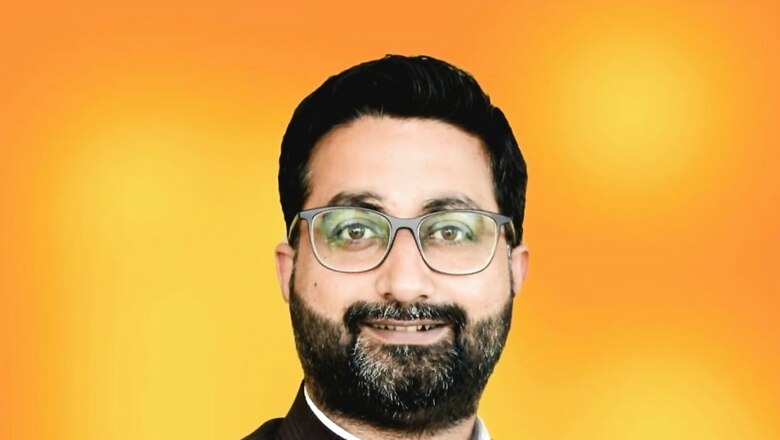
views
It is a big historical event that Danish Azad, a leader from a deprived society among Muslims, that is, the Indic Pasmanda, took oath as a minister in the Yogi Adityanath-led Uttar Pradesh government.
Keeping in mind the question of social justice in the Muslim society, the inclusion of a Pasmanda (backward Muslim) in the cabinet of the Uttar Pradesh government is a historic act no less than the abrogation of Article 370 and the law against instant Triple Talaq.
It is not just for the sake of the vote bank and appeasement but for the upliftment of the underprivileged and those who have suffered in society among Muslims without expecting too much support from their side.
It seems that the question of social justice within Muslim society is facing ignorance by previous central and state governments, so-called secular and liberal intellectuals, socialists and other reformers. Though they are famous for their efforts, commitments and struggles for the downtrodden, underprivileged and suffering communities, unfortunately, they all have a very keen interest in social justice among Hindus and strangely never bothered about social justice among Muslims. They approach the Muslim society considering them as a monolith society which is a big blunder. The Muslim society does have stratification on the ground of caste and creed and there is even more severe discrimination than in the Hindu society.
Also Read: Can Pasmanda Caste Muslims Ever Make a Parallel Rise and Rule Jammu & Kashmir?
There are two main types of Muslim societies in India. First, the converted indigenous Pasmanda society who share their roots with the Hindu community and second, the outsider, ruling class-related Ashraf community which has been enjoying power in India for a long time. It should be noted here that the Ashraf community always discriminated against the indigenous Pasmanda Muslims on the basis of the Pasmandas’ Indian origin and race.
Ashrafs consider Pasmandas as war booty and they are only expected to serve, not lead. Ashrafs also project themselves as the conquerors and Pasmandas as the defeated community. This is the main reason behind the downtrodden, underprivileged and marginalised status of Pasmanda Muslims. It is a historical fact that Pasmanda suffered during Sultanates, Mughals and British periods too.
This is only the second incident in the political history of India where a national-level party, keeping in mind social justice in Muslim society, has given representation to a society that is seen as ‘backward’ in caste structure.
In opposition to the Muslim League advocating the two-nation theory during the independence movement, Jamiatul Mominen (Momin Conference), which was fighting for social justice within the Muslim society under the leadership of Asim Bihari at that time, despite the lack of sufficient resources of organisation, defeated the Muslim League on several seats in the 1946 elections.
Taking cognizance of this, Iron Man Sardar Vallabh Bhai Patel, despite the opposition of the Ashraf Leadership of Congress, had got two members of the Momin Conference, Noor Muhammad and Abdul Qayyum Ansari, included in the cabinet of the state of Bihar without getting the Congress party’s pledge signed.
This is the second time, after Sardar Patel’s decision, in seventy years of independent India that Pasmanda Muslims have found a place in the government on the grounds of social justice among Muslims.
PM Modi is trying to put his steps in the shoes of Sardar Patel which is a good sign for social justice within the Muslim society. The effort of PM Modi is a historical turn on the path of development of the oppressed and deprived Muslims and also the embodiment of the dream of Kabir, Ambedkar, Sardar Patel and Asim Bihari. By doing so, the BJP is also trying to clear the allegations of opposition for not working in the favour of Muslims.
Modi wants to give a clear message that his party and government are committed to the cause of the downtrodden and underprivileged people of India, irrespective of their religion.
Who does not know that, up till now, most of the work done by the previous governments for the Muslims was only for the appeasement of upper-class Muslims? Working for and giving representation to the lower class of Muslims (the Pasmanda community) shows PM Modi’s deep concern about marginalised countrymen and social justice.
Keeping in view the prospects of social justice in Muslim society, if the Modi government brings a Uniform Civil Code bill and reconstitutes the Waqf Board, then it would change the whole political scenario in the favour of the BJP.
By the effort of this historical turn, if Pasmanda Muslims come to support BJP then no other party and alliance could stand against Narendra Modi and BJP would be invincible in future elections.
Dr. Faiyaz Ahmad Fyzie is an author, translator, columnist, media panelist and social activist. He is also a medical doctor. The views expressed in this article are those of the author and do not represent the stand of this publication.
Read all the Latest Opinion News and Breaking News here




















Comments
0 comment